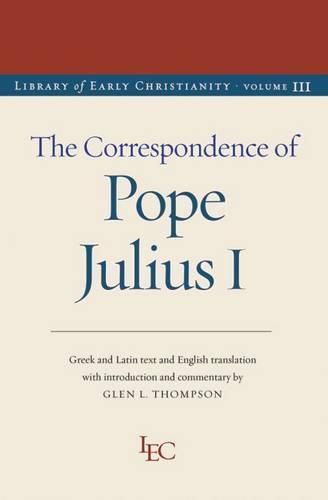Readings Newsletter
Become a Readings Member to make your shopping experience even easier.
Sign in or sign up for free!
You’re not far away from qualifying for FREE standard shipping within Australia
You’ve qualified for FREE standard shipping within Australia
The cart is loading…






Julius I (337-352) was one of the first bishops of Rome to benefit from the imperial sponsorship of Christianity. Elected to o ce in the winter of 337, just six weeks before the death of Constantine the Great, he participated in a moment of expansion of the Church Triumphant. Within his own see, he furthered the monumentalization of spaces devoted to public worship and the growth of the clergy, processes already well underway during the reign of his predecessor. Beyond Rome, he reinforced the prestige and influence of the Apostolic See by intervening in the major church political and doctrinal issues of his day. This collection of six letters written by or to Julius is entirely concerned with the Arian controversy, which, beginning in the aftermath of the Council of Nicaea, wouldcontinue to disturb the peace of the western church until the late sixth century. It includes a long letter in which Julius accounts for his decision to put aside the decisions of eastern councils condemning and deposing Athanasius of Alexandria and Marcellus of Ancyra, two staunch supporters of the Nicene Creed, then under attack by a wide coalition of eastern bishops acting in alliance with the emperor Constantius II (337-61). This letter represents a notable milestone in the process that would culminate in the constitution of the medieval papacy.
Dr. Glen L. Thompson draws the letters together in the first comprehensive critical edition of the letters of Julius since that produced by the Maurist scholar Pierre Coustant in the early eighteenth century. For most letters, Prof. Thompson has collated all extant manuscript sources; the current edition, presenting both the original Greek and Latin texts and a fresh translation, is based on his study of sixty manuscripts. The ancient text is equipped with critical notes and a full catalogue of scriptural and other citations. The facing-page translation is accompanied by copious notes on historical and theological issues. There are four indices: of scriptural citations, modern authors, manuscripts, and proper nouns and key ideas and themes. This volume will be useful to anyone - historians, classicists, theologians - who wishes to learn about this important era in the history of the west. It will be a valuable resource for graduate and undergraduate students as well as professional scholars.
$9.00 standard shipping within Australia
FREE standard shipping within Australia for orders over $100.00
Express & International shipping calculated at checkout
Julius I (337-352) was one of the first bishops of Rome to benefit from the imperial sponsorship of Christianity. Elected to o ce in the winter of 337, just six weeks before the death of Constantine the Great, he participated in a moment of expansion of the Church Triumphant. Within his own see, he furthered the monumentalization of spaces devoted to public worship and the growth of the clergy, processes already well underway during the reign of his predecessor. Beyond Rome, he reinforced the prestige and influence of the Apostolic See by intervening in the major church political and doctrinal issues of his day. This collection of six letters written by or to Julius is entirely concerned with the Arian controversy, which, beginning in the aftermath of the Council of Nicaea, wouldcontinue to disturb the peace of the western church until the late sixth century. It includes a long letter in which Julius accounts for his decision to put aside the decisions of eastern councils condemning and deposing Athanasius of Alexandria and Marcellus of Ancyra, two staunch supporters of the Nicene Creed, then under attack by a wide coalition of eastern bishops acting in alliance with the emperor Constantius II (337-61). This letter represents a notable milestone in the process that would culminate in the constitution of the medieval papacy.
Dr. Glen L. Thompson draws the letters together in the first comprehensive critical edition of the letters of Julius since that produced by the Maurist scholar Pierre Coustant in the early eighteenth century. For most letters, Prof. Thompson has collated all extant manuscript sources; the current edition, presenting both the original Greek and Latin texts and a fresh translation, is based on his study of sixty manuscripts. The ancient text is equipped with critical notes and a full catalogue of scriptural and other citations. The facing-page translation is accompanied by copious notes on historical and theological issues. There are four indices: of scriptural citations, modern authors, manuscripts, and proper nouns and key ideas and themes. This volume will be useful to anyone - historians, classicists, theologians - who wishes to learn about this important era in the history of the west. It will be a valuable resource for graduate and undergraduate students as well as professional scholars.